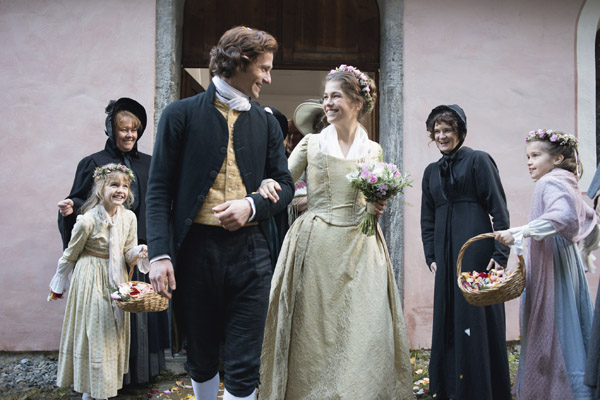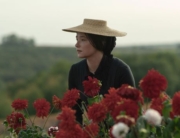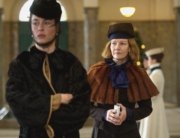
The marriage of Friedrich Schiller and Charlotte von Lengefeld, as seen in Beloved Sisters (Music Box Films)
This beautiful historical drama passionately depicts how the political, social, and cultural revolutionary fervor sweeping late 18th-century Europe inspired women to find ways around restrictions, as exemplified by two German sisters, Caroline and Charlotte von Lengefeld. The film raises their rebellious lifestyle to more significance than their usual relegation to footnotes as the muses for poet/playwright Friedrich Schiller.
The opening scenes set up the limitations that make the pretty sisters just minor noble pawns. Their widowed mother, Louise (Claudia Messner), is more concerned about preserving the family’s fading financial standing (particularly her large set of china) than her daughters’ feelings. She insists that her 16-year-old older daughter, Caroline (Hannah Herszsprung), marry rising aristocrat Baron von Beulwitz (Andreas Pietschmann), and sends her three-years younger daughter, Charlotte (Henriette Confurius), off to be tutored in the ways of the Weimar court by her godmother, Frau von Stein (Maja Maranow). Frau von Stein is supposed to be finding Charlotte a rich match, but she’s a former lover of Goethe and her circle is full of art and romantic intrigue. It’s not that surprising that the politically exiled Schiller (Florian Stetter) turns up at her front window, and he and Charlotte begin flirtatiously teasing each other in verse.
When the poor, handsome writer takes Charlotte up on her offer to visit her family home, it’s during a summer of love—in 1788, with revolution is in the air, stirred by the Age of Enlightenment (and not just for men; in England, Mary Wollstonecraft published Thoughts on the Education of Daughter, soon followed by Vindication of the Rights of Man and the internationally influential Vindication of the Rights of Woman.) In this lovely, riverside idyll, sisters Caroline and Charlotte fall in love with him, and he with them. Marriage to sweet Charlotte would at least provide a cover for the gossips, but that possibility takes a couple of years to come about, until he gains the financial stability of a professorship in Jena to start a family. (The University of Jena is now called Friedrich Schiller University.)
The frustrated, and more sophisticated, Caroline is left supporting their mother, even as she bitterly pursues divorce and another wealthy husband to support her and her mother. When the ménage à trois is reunited, Caroline is not only a devoted aunt to the couple’s children (this looks a bit like the feminine benefits of polygamy), but she also channels her energies into writing. While Schiller’s editing advice on her first novel, Agnes von Lilien, can be condescending, they together share in the joy of its publication, even more than the birth of his and her sister’s offspring. (During Caroline’s lifetime, she would go on to publish two more novels and a biography of Goethe, who is an occasional éminence grise here.)
Writer/director Dominik Graf portrayed a modern noir triangle in Dreileben: Don’t Follow Me Around (2011), and he convincingly makes this film a sensuous, contemporary-feeling circle for separate personal fulfillments, though the sisters come across as more charismatic than Schiller. His trio (mostly) rises above jealousies over the years—and the film pulls frequent quotes from their actual letters—to become much more intense than Philipp Stölzl’s gauzy Young Goethe in Love (2010), what with visual reminders of the violent excesses of the French Revolution.
Even considering their genteel poverty, cinematographer Michael Wiesweg makes it all gorgeous, from sunrises and sunsets over meadows and woods to carriages rumbling down misty country roads. Beloved Sisters is Germany’s submission for the best-foreign language Oscar, and though Schiller and his era are probably more familiar to German audiences, no previous knowledge of their accomplishments are needed to get caught up in their lives.






Leave A Comment